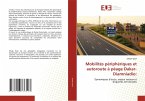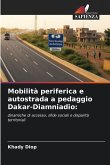In Dakar, the boom in transport infrastructure reflects ambitious urban modernisation dynamics. Among these, the Dakar-Diamniadio toll motorway, the first of its kind in West Africa, embodies a desire to improve traffic flow and open up the suburbs. But behind this showcase of development, contrasting realities are emerging.This book examines the differentiated effects of this infrastructure on daily mobility, access to the city and the living conditions of local residents. Based on rigorous field research, it highlights the territorial disparities caused by tolls, the logic of spatial segregation and the social issues linked to urban planning.Through the emblematic case of Dakar-Diamniadio, this work offers a critical reading of transport policies in contemporary African cities. It is aimed at researchers, urban planners, decision-makers and anyone interested in understanding the links between infrastructure, mobility and spatial justice.
Bitte wählen Sie Ihr Anliegen aus.
Rechnungen
Retourenschein anfordern
Bestellstatus
Storno








